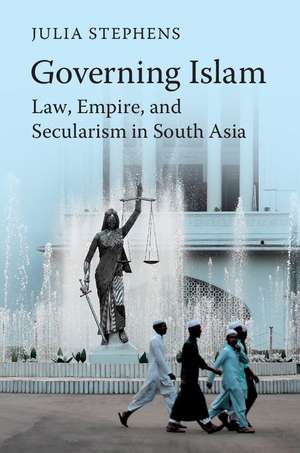Governing Islam: Law, Empire, and Secularism in Modern South Asia
Autor Julia Stephensen Limba Engleză Hardback – 20 iun 2018
Preț: 587.45 lei
Preț vechi: 660.06 lei
-11% Nou
Puncte Express: 881
Preț estimativ în valută:
112.41€ • 117.13$ • 93.07£
112.41€ • 117.13$ • 93.07£
Carte tipărită la comandă
Livrare economică 03-17 aprilie
Preluare comenzi: 021 569.72.76
Specificații
ISBN-13: 9781107173910
ISBN-10: 1107173914
Pagini: 232
Ilustrații: 2 b/w illus. 1 map
Dimensiuni: 157 x 235 x 15 mm
Greutate: 0.5 kg
Editura: Cambridge University Press
Colecția Cambridge University Press
Locul publicării:New York, United States
ISBN-10: 1107173914
Pagini: 232
Ilustrații: 2 b/w illus. 1 map
Dimensiuni: 157 x 235 x 15 mm
Greutate: 0.5 kg
Editura: Cambridge University Press
Colecția Cambridge University Press
Locul publicării:New York, United States
Cuprins
List of maps and figures; Acknowledgments; Note on translation, transliteration, and abbreviations; Introduction; 1. Forging secular legal governance; 2. Personal law and the problem of marital property; 3. Taming custom; 4. Ritual and the authority of reason; 5. Pathologizing Muslim sentiment; 6. Islamic economy – a forgone alternative; Conclusion; Select bibliography; Index.
Recenzii
'This book is nothing less than a landmark in its lucid, subtle, and persuasive arguments about the transformation of Islamic law in its encounter with colonial legal discourses and institutions. Basing herself on an archive of extraordinary breadth, Stephens revises old assumptions about Muslim law and about the consequences of colonial governance at every turn. This analysis of the past illuminates a present in urgent need of fresh understanding.' Barbara D. Metcalf, University of California, Davis
'Governing Islam is a masterful and compelling book that explores modern South Asia's Muslim legal history through ideas about religion, economy, gender, custom, colonialism, and socialism. Using primary sources in multiple languages, Julia Stephens reveals the many layers of law for Muslims. The result is simply superb - a fascinating portrait of vernacular, colonial, and post-colonial legal cultures, all intertwined and with plenty of intriguing twists.' Mitra Sharafi, University of Wisconsin Law School
'A major work of scholarship that brings together the history of law, religion and family in British India to tell the story of South Asian secularism. Erudite and sophisticated in tone this is a much-needed monograph at a time when the idea of secular India faces its gravest threat.' Seema Alavi, University of Delhi, India
'[Stephens'] analysis is convincing, not least because her writing is crisp and well-organized, [but] also because she repeats and summarizes her argument at each new vista, helping the reader grasp even her most subtle arguments … this book [is] a major contribution to the field of modern South Asian history and a useful one in the field of colonial legal history.' Fareeha Khan, Islamic Law and Society
'Governing Islam is an important addition to the disciplines of South Asian legal history, both for its important contributions to legal archival research during the British colonial period as well as for its study of Islamic economics.' Daniel Waqar, Reading Religion
'Governing Islam is a masterful and compelling book that explores modern South Asia's Muslim legal history through ideas about religion, economy, gender, custom, colonialism, and socialism. Using primary sources in multiple languages, Julia Stephens reveals the many layers of law for Muslims. The result is simply superb - a fascinating portrait of vernacular, colonial, and post-colonial legal cultures, all intertwined and with plenty of intriguing twists.' Mitra Sharafi, University of Wisconsin Law School
'A major work of scholarship that brings together the history of law, religion and family in British India to tell the story of South Asian secularism. Erudite and sophisticated in tone this is a much-needed monograph at a time when the idea of secular India faces its gravest threat.' Seema Alavi, University of Delhi, India
'[Stephens'] analysis is convincing, not least because her writing is crisp and well-organized, [but] also because she repeats and summarizes her argument at each new vista, helping the reader grasp even her most subtle arguments … this book [is] a major contribution to the field of modern South Asian history and a useful one in the field of colonial legal history.' Fareeha Khan, Islamic Law and Society
'Governing Islam is an important addition to the disciplines of South Asian legal history, both for its important contributions to legal archival research during the British colonial period as well as for its study of Islamic economics.' Daniel Waqar, Reading Religion
Notă biografică
Descriere
Stephens argues that encounters between Islam and British colonial rule in South Asia were fundamental to the evolution of modern secularism.
